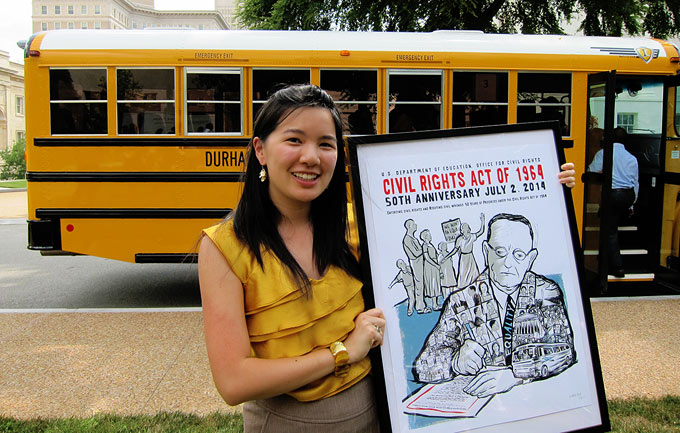
Cindy Dinh ’16
By Andrew Cohen
Cindy Dinh learned about the Freedom Riders in high school. She knew they courageously rode buses in mixed racial groups through the South in the early 1960s—enduring beatings by the Ku Klux Klan, fire bombings, and other violence—to protest the non-enforcement of Supreme Court decisions declaring segregated public busing unconstitutional. But she never imagined sitting with original Freedom Riders on a bus trip celebrating the Civil Rights Act’s 50th anniversary.
“What a memorable experience,” said Dinh, one of 49 students chosen by the U.S. Department of Education to participate in a series of commemorative events July 2-3 in Washington, D.C. “It was thrilling to talk with some of the original Freedom Riders, and with other civil rights-conscious students from around the country.”
Chosen through a competitive process, Dinh joined a diverse mix of high school, undergraduate, doctoral, and law students. Exactly 50 years after President Lyndon B. Johnson signed the Civil Rights Act into law, they boarded three buses—each containing two Freedom Riders. The students rotated seats during the ride, engaging in private chats with icons such as Joan Mulholland, the first Caucasian Freedom Rider.
“Joan told me how her faith brought her there because she wanted to practice what they preached in church,” Dinh conveyed. “She was intent on showing that integration was something everyone should fight for. Another Freedom Rider, Hank Thomas, later served in the Vietnam War. He said he loved his country, but that his country didn’t always love him. They both encouraged us to help protect the voting rights of all people.”
The buses stopped at the U.S. Supreme Court, which invalidated state laws creating separate public schools for black and white students in Brown v. Board of Education in 1954, and at the Lincoln Memorial, where Martin Luther King delivered his “I Have a Dream” speech in 1963.
Upon arriving in Richmond—the one-time Confederacy capital—the students were greeted by Virginia Governor Terry McAuliffe and U.S. Congress member Bobby Scott. Catherine Lhamon, the Department of Education’s assistant secretary for civil rights, delivered keynote remarks in an observance at the Virginia State Capitol.
“It was valuable to hear their perspectives and enjoyable to share my own experiences,” Dinh said. “We can all see how civil rights remain relevant today. It’s not some archaic thing by any means. The legacy of these Freedom Riders is important to keep in mind as we work to level the civil rights playing field across the country.”
Righting civil wrongs
Dinh’s father escaped Vietnam shortly before the Vietnam War, leaving behind his parents and eight siblings to come to the United States as a refugee. Dinh noted that anti-foreigner rhetoric from the Vietnam War, and experiences with a failed government in their home country, made many Vietnamese refugees reluctant to engage in civic and political activities.
In her hometown of Houston—which has the largest Vietnamese-American population outside California—Dinh has organized constituent meetings for Vietnamese Advocacy Day, an annual event bringing nearly 1,000 people to meet with U.S. Congress members. She was part of an advocacy team that successfully urged U.S. Senator John Cornyn to co-sponsor the Vietnam Human Rights Act.
A joint degree candidate in law and public policy at Berkeley Law and Harvard’s Kennedy School of Government, Dinh hopes to continue her advocacy work. “I want to contribute to society in a way that honors my family’s and nation’s histories and empowers immigrant communities to actively participate in the democracy for which they risked their lives,” she said. “That’s why it was so meaningful to be chosen for this Freedom Riders event.”
While an undergraduate at Rice University, Dinh led a coalition of seven student groups to reinstate the school’s first Asian American Studies class in more than a decade. She also interned with the U.S. Department of Justice’s Civil Rights Division, investigating Title VI discrimination complaints. This summer in Houston, she is splitting time between a law firm and the U.S. Attorney’s Office, where her work focuses on health care fraud.
When Dinh returns to Berkeley Law next month, she will spearhead a new student-led initiative to bring implicit bias training to the entire student body and faculty. Her goal: “Help others identify their preconceived notions based on limited connections to certain communities.”